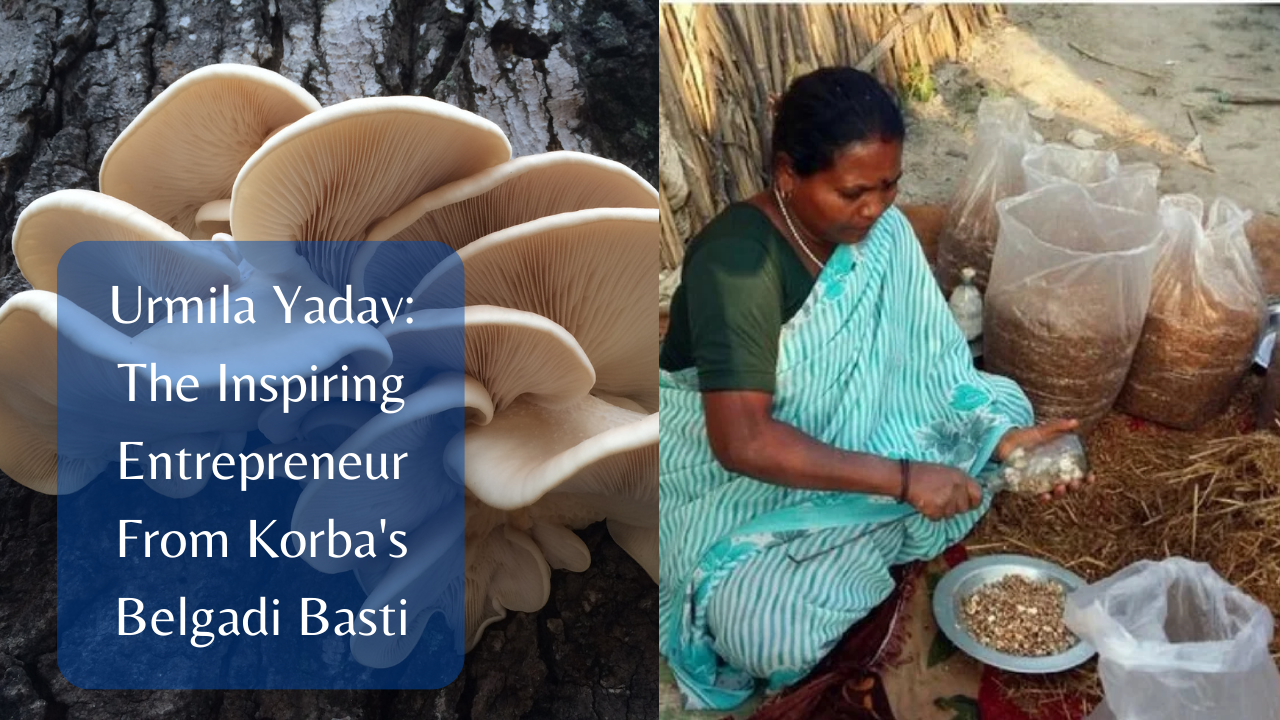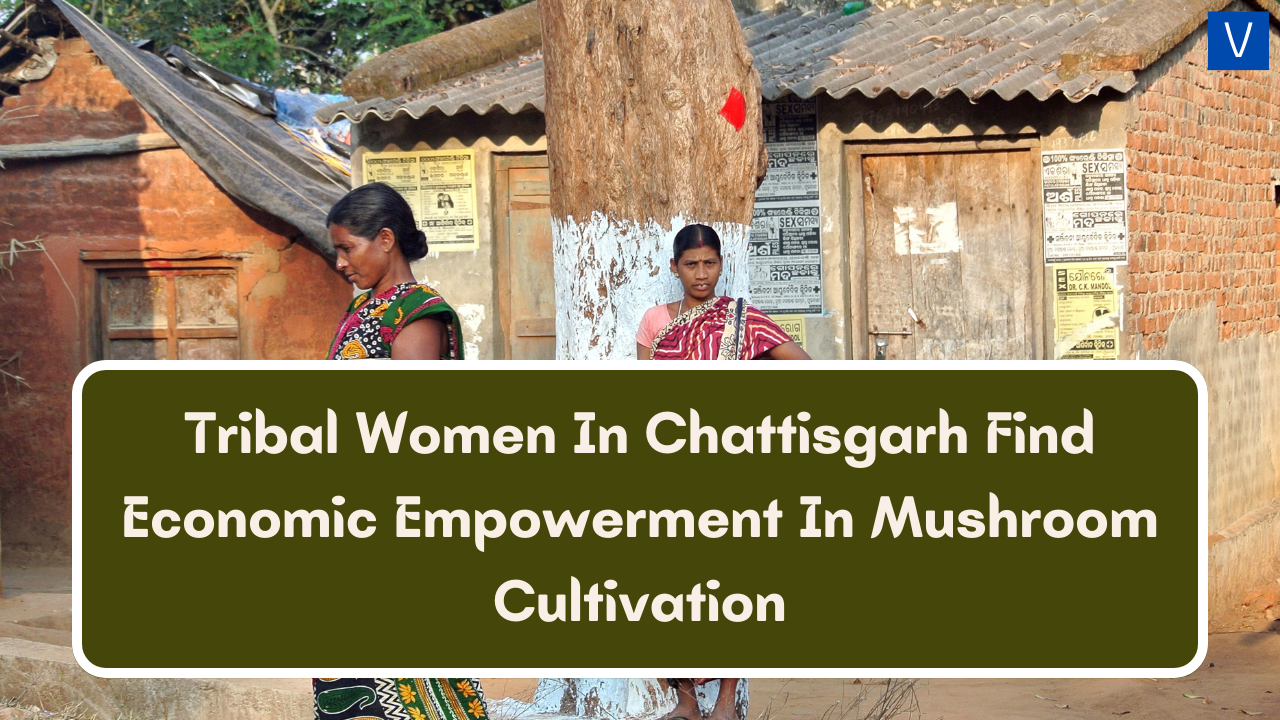Tribal Women In Chattisgarh Find Economic Empowerment In Mushroom Cultivation: In the state of Chhattisgarh, where tribal communities face limited employment and economic prospects, a ray of hope emerged when an organization stepped forward to provide training to tribal women interested in venturing into the world of mushroom cultivation. Let’s delve deeper into this transformative initiative with Jayashiree Elango.
Transforming The Lives Of Rural Indian Women Through Mushroom Cultivation
Jayashiree collaborated with this community as a participant in the India Fellow program, an 18-month experiential journey designed to empower young leaders with a deep understanding of social issues and the tools to drive positive change. As part of this program, fellows engage in impactful projects, leverage their skills, participate in workshops, and embark on journeys across the diverse landscapes of the country.
Korba, located in Chhattisgarh, stands as the third-largest city in the state, boasting a rich tapestry of tribes and indigenous communities. Within this vibrant landscape, an organization known as Dhristee is dedicated to the empowerment of women through self-help groups (SHGs), aimed at establishing micro-enterprises.
Yet, among the numerous hurdles faced in this endeavor, a significant challenge emerges – the need to foster an environment where women feel comfortable sharing their concerns and collaborating effectively to operate these enterprises.
Among the various micro-enterprises explored, one surprisingly profitable venture was the cultivation of mushrooms, those versatile and nutritious fungi. Initially, the attempt to systematically and scientifically cultivate mushrooms on a commercial scale had faltered.
However, the Dhristee team, driven by determination and curiosity, delved deeper to unearth the root causes of this failure. With the women’s consent, they embarked on a journey to enhance their understanding of mushroom cultivation.
This journey took them to a training session at the Jindal Institute in Tamnar, Raigarh, a mere 70 kilometers from the women’s residences. For some, the prospect of exploring a new place ignited excitement, while others saw it as a golden opportunity awaiting them on the horizon.
Urmila Yadav: The Inspiring Entrepreneur From Korba’s Belgadi Basti
Urmila’s commitment to learning mushroom cultivation was evident as she embarked on a journey that began at 5 am and concluded at 10 p.m. Not only did she seize the opportunity for herself, but she also convinced a fellow member from her SHG to join her on this enlightening adventure.

Mushrooms come in a variety of types – such as button, paddy, oyster, shiitake, milky, and more. Some of these varieties are suitable for cultivation in India, but each requires specific conditions to thrive.
Key Factors Affecting The Process: Temperature, Humidity, And Disinfection
In the world of mushroom cultivation, timing is everything. The spawns, essentially the mushroom seeds, come packaged in bottles and have a finite maturation period. Once these spawns reach maturity, they become unsuitable for cultivation. Recognizing this crucial milestone is a skill that Dhristee imparted to the women they were empowering.
Here’s a glimpse into their cultivation process:
- Preparation: The process begins with layering a damp straw bale mixed with disinfectants into a polythene bag. On top of this, they sprinkle partially cooked wheat and seeds.
- Spawning: The next step involves adding a bottle of spawns into the polythene bag. It’s important to note that for optimal yield, it’s advisable to limit the layers to a maximum of four.
- Lifecycle: The mushroom’s lifecycle spans anywhere between 16 to 23 days, during which the women diligently tend to their bags.
- Maintenance: To ensure proper growth, the bags are kept in a shaded area and regularly misted with water.
This meticulous process, taught by Dhristee, not only enables these women to cultivate mushrooms successfully but also empowers them with the knowledge to maximize their yield and make the most of their resources.
Unlocking The Profit Potential Of Mushroom Cultivation With Dhristee
In the realm of mushroom farming, knowledge is power, and for the women under Dhristee’s guidance, this knowledge extends beyond the growing process. A single bag, as it turns out, can yield an impressive 2.5 kilograms of mushrooms, each of which can be sold for prices ranging from Rs 160 to Rs 200 per kilogram.
Dhristee took their commitment a step further by teaching the women essential business principles. They learned about fixed costs, labor management, and how to conduct a break-even analysis for their mushroom cultivation endeavors. In this model, any profit is calculated as the difference between the selling price and the raw material cost, ensuring a clear understanding of financial gains.
However, navigating the intricacies of the tribal belt came with its unique challenges. One of the most critical aspects was ensuring that the women could differentiate between edible fungi and potentially poisonous varieties. The region was rife with myths and misconceptions about various mushroom types, making this aspect of training particularly vital.
Now, returning to our determined protagonist, Urmila Yadav. Following her enlightening training session, Urmila wasted no time in reaching out directly to the trainer, eager to embark on her new entrepreneurial journey.
Urmila Yadav: The Catalyst For Mushroom Cultivation’s Spread
Urmila’s determination knows no bounds. Not only did she dive headfirst into launching her own mushroom cultivation enterprise, but she also played a pivotal role in spreading the knowledge and opportunity to the women in her group.
In an impressive display of initiative, Urmila reached out to the Dhristee team, requesting a promotional hoarding to be placed in front of her house. When asked about her motivation, her response was straightforward: “We are responsible for our own lives.”
Urmila’s actions speak volumes about her sense of responsibility, not only for her own livelihood but for the well-being and empowerment of her fellow women. She stands as a true beacon of self-reliance and community support in the world of mushroom cultivation.
Conclusion
In 2023, mushroom cultivation is changing the fortunes of women in rural India in tangible ways. It is transforming them from mere homemakers into empowered entrepreneurs and community leaders. As this trend continues to gain momentum, it is not only altering the economic landscape but also challenging age-old gender norms, paving the way for a more inclusive and equitable society. Mushroom farming is not just a means of economic growth; it is a symbol of hope and progress for rural women in India.
Must Read: “Binita Kumari, Cultivating Success As A Mushroom Farmer In Bihar”
